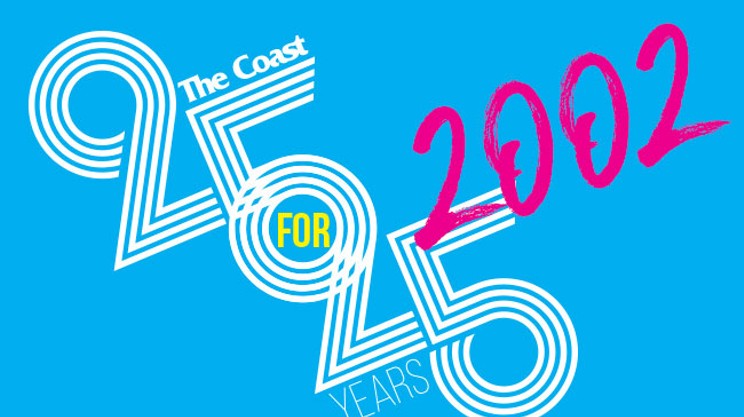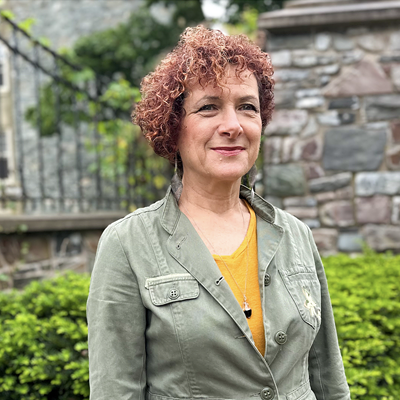Get it out of the way early. You probably already have an opinion about Douglas Sparks, and it almost certainly isn’t good. That’s OK. Get in line.
In January, Sparks, the Halifax Regional School Board’s African-Nova Scotian member, transformed what one newspaper reporter described as a “seemingly innocuous motion” to change the order of seating at board meetings into a dramatic, racially charged confrontation by refusing to sit where he was told.
Let’s start with what we know from news reports. Last fall, school board member Darren Watts—you should remember his name, because he’ll show up again in another context later in this story—brought forward a motion to change the way members arranged themselves around the board’s horseshoe meeting table from alphabetical order to by district. As the African-Nova Scotian member-at-large on the board, Sparks’s chair would be placed after the 12 members from the districts. In the course of the ensuing debate, Sparks invoked the name of Rosa Parks, the recently deceased American black woman who, in 1955, touched off the modern civil rights movement and became as close as you can get to a secular saint when she refused to give up her seat on a bus to a white man.
Watts’s suggestion that Sparks sit at one end of the table in the new by-district schema since he didn’t represent a specific geographic constituency “is not acceptable to me and the people I represent,” Sparks declared. “Ms. Rosa Parks passed away not too long ago and I would say to you that I will not be sitting at any end anywhere for any reason whatsoever.”
When the board met January 12, however, that’s the way the chairs were set up. Sparks refused to sit in his new seat and the new vice chair Debra Barlow, who was running the meeting, ordered him out of the chambers.
“You’re going to have to get somebody to remove me,” Sparks retorted.
The confrontation only ended—at least for that night—when three other board members walked out, meaning there weren’t enough members left to continue, forcing Barlow to adjourn the meeting.
Board chair Wade Marshall was visibly frustrated. “It is very, very unfortunate that one member is causing this kind of disruption,” he told reporters.
“I have sat around this board table longer than anyone else,” complained another board member, “and I have never seen such a waste of time in my life. It doesn’t matter where we sit,” argued Grace Walker.
Grace Walker. Remember her name too. And what she said. We’ll come back to it later.
The public outcry was predictable. “Doug Sparks isn’t Rosa Parks,” Daily News columnist David Rodenhiser wrote a few days after the first debate. “He should be ashamed of himself.”
Doug Sparks is no Rosa Parks. Hold that thought too.
“Sparks’s temper tantrum…was worthy of a grade primary student,” said radio talk show host Rick Howe. Upping the ante, Alex J. Walling, in an online column, claimed Sparks was “acting like a juvenile delinquent,” and added “I would like to see the Halifax school board get a bit of guts and tell him where to go…. If he won’t go…please call the cops and have him dragged out.”
Sparks’s fellow black leaders were scarcely more sympathetic. Wayne Adams, Nova Scotia’s first black cabinet minister, pointedly suggested Sparks “could use a lesson or two on diplomacy and deportment.” Delvina Bernard, a prominent local black activist, told the CBC “Perhaps he should put this behind him and take his seat…and get on with the business of representing African-Nova Scotian youth.”
The Great Seating Plan War of 2006 quickly turned so nasty, the school board no longer meets in its usual chambers, but has been holding its sessions at schools around the district where there are no pre-determined seating assignments. The province’s human rights commission has even offered to mediate the dispute.
Is this really just a debate over who sits where around a table? Or is there more to it? And if Doug Sparks isn’t Rosa Parks, then who is he?
From the picture window of his neat, modern home on the Mineville Road just beyond Dartmouth’s suburban mall sprawl, Doug Sparks is conducting a family history tour.
The property this house stands on, he tells me proudly, has been in the family since 1816. That’s when a runaway slave named General Taylor first settled it. The rocky land—along with his freedom—was Taylor’s reward for helping the British in the War of 1812.
“Over there,” Sparks says, pointing, remnants of a rock wall Taylor and his descendants built still stand. Sparks’s late grandmother was born near that “big old elm tree,” he adds, and lived for many years in the house next door to this one. Doug Sparks can even point to a nearby apple tree where, as a kid, he and his friends tossed apples at one another and, occasionally, ganged up on an annoying little girl named Lisa. That little girl would eventually grow up to become his wife and the mother of their three daughters.
We are—or, more properly, were—in East Preston, one of the clusters of rural enclaves that make up the Prestons, Nova Scotia’s largest black community. “My grandmother’s birth certificate says Preston,” Sparks insists. “My mother’s too.”
But in 1997, when Nova Scotia introduced 9-1-1 and assigned every house in the province a new four-digit address, Sparks’s side of the Mineville Road inexplicably—or perhaps not so inexplicably—ended up part of Lake Echo, an encroaching suburban white community.
On the one hand—just like who sits where at school board meetings—changing the community’s name should not have been a big deal. But for Sparks, the name change was about something more, and more troubling. It was about “property values”—the white residents down the road, he says, were worried the stigma of having an East Preston address would drag down the re-sale value of their houses—and that, of course, was just another way of saying the real issue was race.
As president of the East Preston Ratepayers’ Association, Sparks fought the name change. He lost. But he’s never given up. To this day, his address in the telephone directory reads “East Preston.” And he uses “East Preston” as the return address on his mail, much to the chagrin of Canada Post.
“I don’t let anyone’s expectations be my reality,” he explains quietly.
It could be his mantra.
That seemingly innocuous late-’90s battle over whether he lived in East Preston or Lake Echo played out against a backdrop of more dramatic incidents of racial tension in Halifax.
In 1989, the first of a series of brawls between blacks and whites took place at Cole Harbour High School. In 1991, an incident in a downtown bar sparked a confrontation between riot police and 150 young blacks. In 1992, the Metropolitan Authority announced the short list of communities it was considering for the site of a new city dump—all were near predominantly black communities. In 1994, a white university student named Darren Watts was attacked and savagely beaten by a gang of blacks outside a local fraternity house. Over the next two years, eight young black men were convicted and sentenced to prison for their roles in the assault. For many blacks, including Doug Sparks, the harsh sentences turned out to be almost as shocking as the crime.
A few days after city council confirmed its decision to change his community’s boundaries, Sparks wrote an angry letter to the editor of the Daily News: “There is a feeling that blacks and other groups are getting special privilege,” he noted. “The truth is that white people have received and continue to receive special privilege in employment, justice, education and all other institutional structures in North America…. How about justice? A man who beats his mother to death gets two years, while eight young black males get eight to 10 years for assaulting Darren Watts. Both actions are wrong, but can anyone explain the fairness of the sentences given?”
Darren Watts, who spent some time in a coma as a result of that attack, eventually recovered from his injuries. In 2004, after running unsuccessfully in the 2003 provincial election for the Liberals in Halifax Atlantic (Sparks ran, equally unsuccessfully, in Preston for the NDP), Watts won a seat on the Halifax Regional School Board by acclamation.
Last fall, of course, it was that same Darren Watts who proposed the motion that would effectively move Doug Sparks’s seat to the far end of the school board chamber.
If Doug Sparks was not born with a chip on his shoulder, he had certainly grown one by the time he was a teenager. For the first 12 years of his life, Doug and his mother—his father was never in the picture, he says—lived with his grandparents in East Preston. It wasn’t until grade 5 when he graduated from the all-black local community school to integrated Ross Road School that he discovered the divide between black and white. “Kids started calling us names we never heard before.”
The following year, name-calling turned into fist-fighting when his mother moved him to Dartmouth so she could take a job there. “For the first couple of weeks, I had to fight pretty much every day on the way to and from school,” he remembers. “Some kids would use the ‘N’ word and some would say stuff like ‘You think you’re tough because you come from Preston,’ or ‘We don’t want your type here,’ that sort of thing. I had to fight; I couldn’t let them bully me. After a couple of weeks,” he adds with a certain sense of satisfaction, “it was all settled.”
And it stayed settled—mostly.
At Dartmouth High School, Sparks blossomed. He not only became president of his school’s Cultural Awareness Youth Group, a newly formed organization designed to foster pride among young blacks, but he was also elected president of the student council at what was still a largely white high school. Today, he looks back fondly on those years. That’s not to suggest there weren’t occasional reminders of race lurking beneath the surface. “One time,” he recalls, CAYG decided to organize a dance “with our music. We had to get double the security for a regular dance.”
But CAYG was about much more than organizing dances. Founded in 1982 by black artist and activist David Woods as an independent, non-profit society “dedicated to the cultural, educational and career development of black youth in Nova Scotia,” CAYG soon had branches in all Metro high schools. CAYG was instrumental in helping to organize the first local Black History Month in 1984 as well as sponsoring student events like Quest for Identity, a black history quiz—“that’s where I learned that a Nova Scotian woman named Viola Desmond had refused to sit in the black section of a movie theatre even before Rosa Parks and the bus”—and debating events at which young people could argue the merits of seminal episodes in local black history such as the relocation of Africville.
CAYG “got results,” says Sparks. “Lots of the kids who started there ended up as teachers and lawyers and community leaders.”
For his part, Sparks became the first member of his family to graduate from university, earning a sociology degree from Saint Mary’s in 1988.
He was soon back with CAYG as its program coordinator. “That was one of my most rewarding jobs,” he says now. In 1989, he helped organize a trip to Atlanta, Georgia, for 32 local high school students. “It was so empowering,” he says. “For the first time, we weren’t the minority. The kids could look around and see black faces everywhere. Me as well,” he adds. “I was awed.”
Back in Halifax two years later, after discrimination against blacks in the downtown bar district sparked a riot, CAYG—over the objections of most established local black organizations—organized a march from the north end of the city through the bar district and into the well-to-do white south end. More than 1,000 people—mostly blacks but also whites, including the province’s attorney general and a former premier—took part in the hugely successful march that one news report later described as a “boisterous display of unity against racism.”
Sparks’s involvement with CAYG convinced him even more strongly of the role education could play in creating better futures for black youths. Though he was only 25, he ran for—and won—a seat on the Dartmouth School Board in 1991 and then went back to school part-time himself, eventually earning a Bachelor of Education degree from Dalhousie University.
In 1998, Sparks became the program director of the Lucasville-Upper Hammonds Plains Development Centre. There, he worked on a strategic development plan for the predominantly black communities and smacked up against what you can choose to think of as an unfortunate coincidence or—like Doug Sparks—choose to believe is part of a broader pattern of discrimination.
Although Upper Hammonds Plains includes Pockwock Lake, which supplies water for the Halifax Regional Municipality, local residents still had to draw their drinking water from wells, half of which produced water unfit for drinking.
The water commission did offer to supply the residents with water, but at a cost that meant some residents would have been paying more than $40,000 just to get city water piped in from what was effectively their own neighbourhood. In 1999, Sparks was part of a community coalition that filed a complaint of discrimination about that with the province’s human rights commission.
A month after making their complaint public, residents finally did strike a better deal with the city to extend water services to their homes, and the city even agreed to refund them a portion of what they had to pay if the project cost less than projected. It did. But the city refused to keep its side of the bargain, and residents had to sue to get the city to live up to its promise. Last year, the residents finally won their case in court, but the protracted process—like much of the rest of his life’s experiences—helped calcify that chip on Doug Sparks’s shoulder, the one that was to become so very public during this winter’s Great Seating Plan War.
The Great Seating Plan War of 2006 actually began well before Darren Watts introduced his motion to shuffle the deck chairs on what had, by then, become a badly listing Titanic of a school board. The board, most observers agree, had been dysfunctional almost from the day it was elected in October 2004.
Mike Flemming, who chaired the board for one- and-a-half years prior to the last election, says the problem is that the relationship between board superintendent Carole Olsen and a group of board members is just too close. “You have to trust staff,” he notes, “but you shouldn’t have blind faith in whatever staff proposes.” Olsen, he adds, “has cultivated relationships with certain board members, so that one group has all the knowledge and the power and will do whatever staff wants. In that situation, debate becomes meaningless and education suffers.”
According to Sparks, the board quickly divided into “them” versus “us” with superintendent Olsen, chair Wade Marshall and six other board members—including Watts, Walker and Barlow—effectively running the show. Although Bernadette Reid, a black board member elected from the Preston-area District 3, was chosen as vice chair, Sparks says she was never part of the “in” crowd and other board members went out of their way to undermine her.
In the end, Reid became the fuel that turned the board’s long smoldering tinderbox of personal and political resentments and animosities into a full-blown conflagration—and, in part, triggered Watts’s “seemingly innocuous” motion to rearrange the seating plan.
In January 2005, suspicious board officials had ordered an audit to determine how money raised for field trips, band performances and other non-academic expenses at Gaetz Brook Junior High School was actually being spent. The school’s principal was Carl Reid, husband of Bernadette. The audit showed $11,333 had gone missing. Reid resigned as principal and paid the money back.
But the audit also showed that Bernadette Reid’s company, AlySam Greeting Cards and Cultural Products, had sold less than a thousand dollars worth of African drums, jewellery and clothing to two schools, including her husband’s—in violation of municipal conflict-of-interest regulations.
At its June 29 board meeting, Barlow would call for an investigation into Reid’s “knowledge and actions” in the case and for the board to remove her as vice chair. Although the non-confidence motion did pass 8–5, it wasn’t the two-thirds majority needed to remove her and Reid refused to quit. But the board did hire an outside lawyer to look into the conflict allegations.
Four months later, Barlow introduced a motion to remove Reid from the school board entirely based on that $25,000 lawyer’s report because she had “breached her fiduciary duties of loyalty and good faith to the Halifax Regional School Board and further engaged in breach of trust and misconduct.” That motion, which didn’t require the two-thirds majority, passed 7–5, paving the way for the board to ask the province to appoint a judge to resolve the matter.
At the same meeting, Barlow was elected the board’s new vice chair. Bernadette Reid did not reoffer.
A month after that, Darren Watts introduced his “seemingly innocuous” motion.
To understand what happened after Watts introduced that motion, we should first rewind back to the night of June 1, 2005, and a two-and-a-half-hour meeting of the board’s audit committee.
The Reid case wasn’t yet on the board’s official radar, but Doug Sparks is convinced some board members were already out to get rid of her. During the audit committee meeting, members voted—over Sparks’s objections—to recommend the board cancel its membership in the Nova Scotia School Boards’ Association. The NSSBA is a 51-year-old organization comprised of all the school boards in the province; it lobbies the province on behalf of the boards. Sparks didn’t buy the official line that the city could lobby more effectively and more cost-efficiently on its own; he was convinced it was because Reid had defeated Barlow in a board election to become the board’s official representative on the provincial body. (Now that Reid is out of the picture, the board is considering a motion—introduced by Watts—to rejoin the association.)
Like Flemming, Sparks was also convinced the board was under the spell of its superintendent.
Within months of her appointment, for example, Olsen, a former Ontario educator, had hired a woman she’d worked with on an Ontario provincial task force on a six-month, untendered contract to do policy research. That contract, which was later extended, cost the board more than $70,000 before the position was finally made permanent and the woman won it in a public competition. Technically, the initial contract didn’t reach the $50,000 threshold that required Olsen to get board approval for it—a staff report says the board’s chair and vice chair signed off on the deal but Flemming, who was chair at the time, says he never approved it—but Sparks believed that, at the very least, the decision to extend the contract should have come before the board for approval.
Which is one reason why he’d started asking staff for information on untendered contracts. He was finally told to put his requests in the form of motions to the board. Based on what he knew of the dynamics of the board, Sparks says he concluded such motions wouldn’t pass so he never pursued them. But he did demand an investigation to find out if any of the board’s current members—or even those who didn’t reoffer or were defeated in the last school board election—had had conflicts of interests in their dealings with the board. The board defeated that motion.
Perhaps not surprisingly, given the ongoing hostilities around the table, that evening’s audit committee meeting was also tense. Sparks’s own frustration boiled over during discussion of a proposal to approve the board’s 2005-06 General Fund Business Plan, which included money for three new Human Resources positions and a Communications job. He thought the money could be better spent in the classroom and proposed an amendment to defer approval “until the board receives a rationale for these four additional positions.” The amendment was defeated. An angry Sparks complained that too many board members had their heads “so far up staff’s… you know, where the sun don’t shine—that you can’t see any fault with anything staff wants to do.”
At 7:44 a.m. the next day, Grace Walker, who sat next to Sparks, wrote an impassioned email to chair Wade Marshall in which she complained about what she called “the inappropriate behaviour/statement of the board member to my left,” and requested that Marshall “immediately change our seats to numerical order of our districts.”
Nothing happened immediately, but six months later, Darren Watts introduced his “seemingly innocuous motion,” which—though it was never stated publicly—directly responded Walker’s request to rearrange the seating plan so she would not have to sit next to Doug Sparks anymore.
When I emailed Watts last week to ask why that particular motion and why then, he replied he’d be happy to answer my questions—later. “I hope we can wait until the Board has completed the mediation process, which is currently underway,” he wrote. That mediation process isn’t expected to even begin until late this month.
And yes, you are remembering correctly. In January, in the midst of the nasty debate over seating arrangements, it was Grace Walker who’d declared: “It doesn’t matter where we sit.”
I also emailed Walker to ask for her explanation of all of this. As of our press deadline at noon on Wednesday, there’d been no response.
So there’s the story—and then there’s the rest of the story. When Doug Sparks refused to take his assigned seat in the school board chambers in January, it was—for him at least—about far more than who sits where.
He was certain that Darren Watts’s “seemingly innocuous” motion to change the board’s seating plan wasn’t simply intended to ensure—as Watts had put it—“that there’s some reasonable semblance of order to seating.” It was because Grace Walker didn’t want to sit next to him. Walker’s district, Sparks didn’t need to be reminded, included Eastern Passage, a working-class white community whose young men often clashed with black youth from the Prestons. And Darren Watts was…well, he was “the Darren Watts case.” It wasn’t Watts’s fault, of course, that he’d been attacked by a gang of blacks, and he’d had no control over the sentences handed out to them. Still, his name was a reminder to many blacks, including Doug Sparks, of yet another instance of unfair treatment at the hands of the white establishment.
Put those pieces together—and combine them with a lifetime of seemingly minor, maybe-maybe-not-but-probably instances of discrimination—and you begin to understand how Doug Sparks might see a new seating plan as more than just a new seating plan.
None of that, of course, necessarily makes Doug Sparks right—or a candidate for sainthood. He is the first to tell you he can be loud, and there’s no question he is easy to offend and abrasive when offended. He sometimes rubs even those who support him the wrong way.
“If Doug has one fault,” says Mike Flemming, who counts himself as one of Sparks’s friends, “it is that he is unwilling to play the political game, and sometimes you just have to do that.”
Rosa Parks? Much has been made of the fact Doug Sparks invoked her sacred name instead of simply doing the “appropriate” thing and taking his assigned seat at a school board table.
“To use that darling lady who stood up for her rights on a bus a long time ago, shame on us,” as Grace Walker put it during the debate. “Shame, shame, shame. That’s all I have to say because that’s not right. That woman did so much good. To compare that to sitting at a board table. Shame.”
It is worth remembering, however, that before she became a “darling lady” and a civil rights icon, Rosa Parks was just a poor young black woman who refused to do the “appropriate” thing and give up her seat to a white man. Instead, she stood up for what she believed was right.
Is that what Doug Sparks did? Maybe, maybe not.
He knows he hasn’t done himself—or his political future—any favours. “For all this to erupt over something as silly as a seat is too bad,” says Flemming. “I said to him, ‘Look, Doug, this is killing you politically.’ And he said, ‘Mike, I don’t care. I have to do this.’”
Sparks, who is already nominated to run for the NDP in the next provincial election, is well aware of what people are saying. “People say, ‘Here he goes again.’ They tell me, ‘Don’t rock the boat.’” Doug Sparks pauses. “But that’s not the way I was brought up. I was brought up to stand up for what’s right, and that’s what I have to do.”
And he does.













